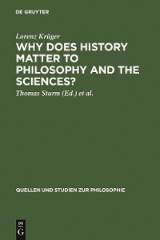Details

Why Does History Matter to Philosophy and the Sciences?
Selected EssaysQuellen und Studien zur Philosophie, Band 66 1. Reprint 2012
|
113,95 € |
|
| Verlag: | De Gruyter |
| Format: | |
| Veröffentl.: | 14.02.2012 |
| ISBN/EAN: | 9783110927672 |
| Sprache: | englisch |
| Anzahl Seiten: | 283 |
DRM-geschütztes eBook, Sie benötigen z.B. Adobe Digital Editions und eine Adobe ID zum Lesen.
Beschreibungen
<p>Wie sind Philosophie und Philosophiegeschichte, Wissenschaftsgeschichte und Wissenschaftstheorie aufeinander bezogen? </p>
<p>Diese Auswahl von Essays von Lorenz Krüger (1932-1994) präsentiert exemplarische Studien zur Philosophie John Lockes und Immanuel Kants, zur Geschichte der Physik, sowie zu den Möglichkeiten und Grenzen wissenschaftlicher Erklärung und einer realistischen Auffassung von Wissenschaft und Wahrheit. In Auseinandersetzung mit führenden philosophischen Richtungen des 20. Jahrhunderts präsentiert Krüger neue und originelle Argumente für ein vertieftes Verständnis von Kontinuität und Dynamik wissenschaftlicher Theorieentwicklung. Daraus ergeben sich bedeutsame Konsequenzen für den Anspruch der Wissenschaften, die Wirklichkeit auf rationale Weise zu verstehen. Die Fallstudien werden ergänzt durch grundsätzliche Überlegungen zum Verhältnis zwischen der Philosophie, den Wissenschaften und ihrer gemeinsamen Geschichte.</p>
<p>Diese Auswahl von Essays von Lorenz Krüger (1932-1994) präsentiert exemplarische Studien zur Philosophie John Lockes und Immanuel Kants, zur Geschichte der Physik, sowie zu den Möglichkeiten und Grenzen wissenschaftlicher Erklärung und einer realistischen Auffassung von Wissenschaft und Wahrheit. In Auseinandersetzung mit führenden philosophischen Richtungen des 20. Jahrhunderts präsentiert Krüger neue und originelle Argumente für ein vertieftes Verständnis von Kontinuität und Dynamik wissenschaftlicher Theorieentwicklung. Daraus ergeben sich bedeutsame Konsequenzen für den Anspruch der Wissenschaften, die Wirklichkeit auf rationale Weise zu verstehen. Die Fallstudien werden ergänzt durch grundsätzliche Überlegungen zum Verhältnis zwischen der Philosophie, den Wissenschaften und ihrer gemeinsamen Geschichte.</p>
<p>What are the relationships between philosophy and the history of philosophy, the history of science and the philosophy of science? </p>
<p>This selection of essays by Lorenz Krüger (1932-1994) presents exemplary studies on the philosophy of John Locke and Immanuel Kant, on the history of physics and on the scope and limitations of scientific explanation, and a realistic understanding of science and truth. In his treatment of leading currents in 20th century philosophy, Krüger presents new and original arguments for a deeper understanding of the continuity and dynamics of the development of scientific theory. These result in significant consequences for the claim of the sciences that they understand reality in a rational manner. The case studies are complemented by fundamental thoughts on the relationship between philosophy, science, and their common history.</p>
<p>This selection of essays by Lorenz Krüger (1932-1994) presents exemplary studies on the philosophy of John Locke and Immanuel Kant, on the history of physics and on the scope and limitations of scientific explanation, and a realistic understanding of science and truth. In his treatment of leading currents in 20th century philosophy, Krüger presents new and original arguments for a deeper understanding of the continuity and dynamics of the development of scientific theory. These result in significant consequences for the claim of the sciences that they understand reality in a rational manner. The case studies are complemented by fundamental thoughts on the relationship between philosophy, science, and their common history.</p>
<p>Did Kant Aim to Prove the Completeness of the Table of Judgments? (1968) · Was John Locke an Empiricist? (1970) · Matter For Us and in Itself - What Are Primary Properties? (1989) · Intertheoretic Relations as a Tool for the Rational Reconstruction of Scientific Development (1980) · Reduction as a Problem: Some Remarks on the History of Statistical Mechanics from a Philosophical Point of View (1980) · Are Statistical Explanations Possible? (1976) · Causality and Freedom (1992) · How Philosophy and Science Came to Differ (1988) · Does Progress in Science Lead to Truth? (1991) · Has the Correspondence Theory of Truth Been Refuted? From Gottlob Frege to Donald Davidson (1995) · Why Do We Study the History of Philosophy? (1984)</p>
<p><em>Lorenz Krüger </em>(1932-1994) lehrte als Professor für Philosophie an der Universität Bielefeld, an der Freien Universität Berlin und an der Universität Göttingen. Er leitete seit 1992 das "Zentrum für Wissenschaftsgeschichte und Wissenschaftstheorie" in Berlin und wurde 1993 als einer der drei Gründungsdirektoren des Max-Planck-Instituuts für Wissenschaftsgeschichte berufen.</p>

















